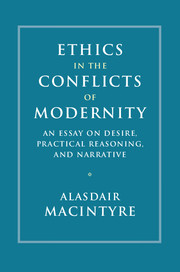Book contents
1 - Desires, goods, and ‘good’: some philosophical issues
Published online by Cambridge University Press: 01 December 2016
Summary
Desires, why they matter, what they are; what is it to have a good reason for desiring something?
Human lives can go wrong in a variety of ways and from different causes: as a result of malnutrition, illness, injury, or untimely death, from the malice, envy, or insensitivity of others, because of lack of self-knowledge or excess of self-doubt – the list is a long one. I want to focus on lives that go wrong on account of misdirected or frustrated desire. These too can be of different kinds. Someone who had set her heart on just one thing – athletic success, fame as a celebrity, preeminence as a physicist – and fails to achieve it may thereafter lead the unhappy life of a disappointed woman. Someone who wants too many different things and is recurrently diverted from his pursuit of this by the attractions of that may suddenly find that he has squandered his life away without achieving very much. Someone who wants and aspires to too little, perhaps from fear of the pain of disappointment, may never recognize that their talents and skills have never been put to adequate use. Such examples make it clear that when lives go wrong in these various ways, frustrated or misdirected or inadequate desire has played a part, even if not the only part, in making them go wrong.
The woman who had set her heart on athletic success perhaps failed to achieve it because of an injury. But it is her inability to find and pursue other objects of desire that makes her life one of disappointment. The man who wants and aspires to too little does so perhaps because of lack of self-knowledge or excess of self-doubt or both. The flibbertigibbet who pursued too many things may have had friends who encouraged him in his wasteful ways, not friends who might have given him good advice. The woman or man who invests all their hopes in a single lifelong project and is then defeated in their final attempt to complete that project will, like Gatsby in Scott Fitzgerald's novel, have “paid a high price for living too long with a single dream.”
- Type
- Chapter
- Information
- Ethics in the Conflicts of ModernityAn Essay on Desire, Practical Reasoning, and Narrative, pp. 1 - 69Publisher: Cambridge University PressPrint publication year: 2016
- 1
- Cited by



